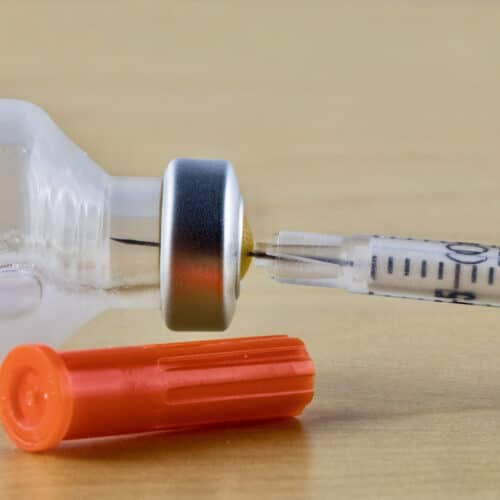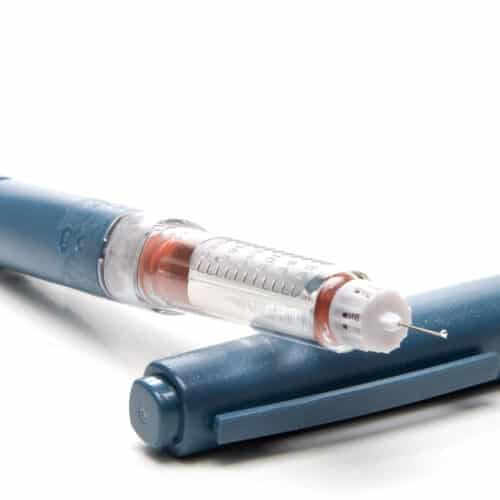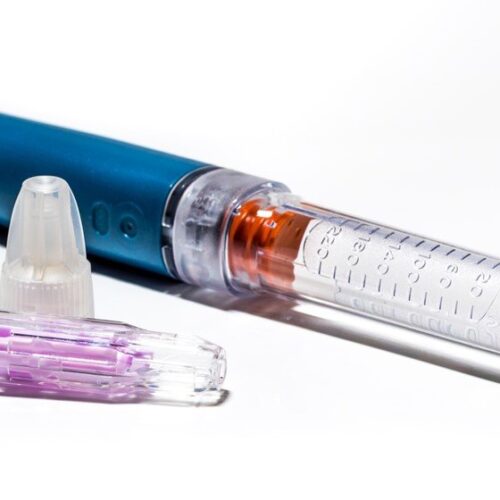Parkinson’s and diabetes

Diabetes is a chronic condition affecting 4.5 million people in the UK. Research indicates there is a relationship between Parkinson’s and diabetes, with some recent data suggesting treatment or prevention of diabetes may also reduce the risk of Parkinson’s or affect progression of the condition.
What is diabetes?
Diabetes is a medical condition where blood sugar (or glucose) levels in the body are too high. Everybody needs glucose – it is a source of energy that our cells are able to convert and use. Our bodies break down glucose from the food that we eat or drink, and this is released into the bloodstream.
A hormone called insulin – produced by an organ called the pancreas – acts like a key to unlock the cells’ ability to absorb glucose from the bloodstream. Glucose that is absorbed is then used as energy. It is the pancreas that regulates this process and senses the right amount of insulin needed to be released. In diabetes, this is faulty.
There are two types of diabetes. Type 1 diabetes is a condition in which the pancreas produces little or no insulin, and usually starts early in life. In Type 2 diabetes – which accounts for 90% of diabetes cases – cells stop recognising and responding to insulin. Glucose levels in the body rise after we have eaten and typically, the pancreas detects this, producing insulin to reduce glucose levels. In people with Type 2 diabetes, cells no longer respond to insulin, preventing uptake of glucose. When cells don’t respond to the insulin, this is called insulin resistance.
If glucose levels continue to rise in the blood, this is referred to as glucose intolerance.
Is there a link between Parkinson’s and diabetes?
For a long time, researchers have known that there is a close relationship between Parkinson’s and Type 2 diabetes; a significant proportion of people with Parkinson’s have glucose intolerance and some also live with diabetes.
Insulin also controls glucose in the brain and has been shown to impact dopamine levels – a chemical released in the brain and used to send messages between nerve cells. Research shows that insulin also helps with our cognitive function – the ability to think clearly, learn, and remember.
Notably, defects in insulin processes in the brain may contribute to Parkinson’s.
Research has suggested that people with Type 2 diabetes are 40% more likely to develop Parkinson’s than those without. In addition, individuals with Parkinson’s who are diabetic often have a more rapid progression of their symptoms, so careful management of both conditions is important.
Currently, 1 in 14 people in the UK have Type 2 diabetes, and that number is increasing. The risk of developing Parkinson’s in a person’s lifetime is also growing. Therefore, it is important to understand the relationship between the two conditions, and whether certain Type 2 diabetes medications might be able to slow the progression of Parkinson’s.
One common form of medication used in the treatment of diabetes is a class of drug called GLP-1R agonists.
GLP-1R agonists and Parkinson’s
GLP-1R agonists are a class of drugs that function by mimicking the action of naturally produced hormones in the gut called glucagon like peptide-1 (GLP-1). When eating food, GLP-1 is one of the hormones that stimulates the pancreas to release insulin, lowering glucose levels in the blood. GLP-1 receptors, or proteins on the outside of cells that GLP-1 binds to in order to trigger a change in the cell, are present throughout the body, including in the brain. This has led researchers to wonder what the role of GLP-1 is here and whether if it may be implicated in Parkinson’s.
Many studies have shown that GLP-1R agonist actions in the brain occur in a variety of ways; effecting neurogenesis (the process of forming new neurons in the brain), improving energy function, and providing a supportive and protective effect. The first GLP-1R agonist approved for the treatment of Type 2 diabetes was exenatide.
GLP-1R agonists have been assessed for their use in Parkinson’s and Cure Parkinson’s have supported a number of clinical trials in this area. For information on these projects, please see the projects page.
It’s important to note that the vast majority of people with diabetes do not develop Parkinson’s and similarly, the majority of people with Parkinson’s do not have a diagnosis of diabetes.

Phase 2 trial results of lixisenatide published
The full results of the one-year, phase 2 clinical trial of Type 2 diabetes drug lixisenatide have now been published. This Cure Parkinson’s co-funded trial has reported positive results,…

Spring Research Update meeting 2024: watch again
Our Spring Research Update Meeting once again took place at the renowned Royal Society of Medicine, Wimpole Street, London where we invited guests to an inspiring agenda of some…

Preliminary phase 2 trial results of lixisenatide presented
A one-year, phase 2 clinical trial of Type 2 diabetes drug lixisenatide has reported positive early results, which indicate that the treatment may slow the progression of motor (or…

The influence of diabetes on Parkinson’s progression
In recent research funded by Cure Parkinson’s, scientists have provided the strongest evidence to date that diabetes can affect the progression of Parkinson’s.

Liraglutide trial: results
Researchers from Cedars Sinai Hospital, Los Angeles have presented their initial top line results of the liraglutide trial, co-funded by Van Andel Institute and Cure Parkinson’s, at the recent…

Diabetes dual agonist drugs for Parkinson’s
Glucagon-like peptide 1 receptor (or GLP-1R) agonists are recognised as a frontline treatment for diabetes. Researchers have recently been developing the next generation of treatment for diabetes which target…

The exenatide phase 3 study protocol
Researchers conducting the phase 3 ‘Exenatide PD3’ clinical trial have published the protocol of the study, which outlines the details of the trial. Cure Parkinson’s is supporting two sub-studies…

Further support for diabetes treatments for Parkinson’s
A research group in South Korea has published results of their trial which provide further evidence that diabetes treatments can slow down the development of Parkinson’s in people with…

Further data on the relationship between diabetes and Parkinson’s
New research has found that there is convincing evidence that Type 2 diabetes is associated with a greater risk of Parkinson’s, but may in turn allow for better management…

Type 2 diabetes medications impact risk of Parkinson’s
In a recent study, researchers have concluded that the elevated risk of Parkinson’s in patients with type 2 diabetes might be mitigated depending on the type of drugs prescribed…

The liraglutide trial for people with Parkinson’s
This clinical trial will test the efficacy and safety of the diabetes drug liraglutide (a GLP-1 agonist) in people with Parkinson’s. The trial is taking place at the Cedars-Sinai…

Exenatide: further studies initiated
In 2012, Cure Parkinson’s initiated the International Linked Clinical Trials (iLCT) programme to focus on identifying and prioritising potentially disease-modifying therapies for Parkinson’s. The first drug to be prioritised…

New developments in diabetes drugs for Parkinson’s
At the forefront of treatments for diabetes is a class of drug called glucagon-like peptide 1 receptor (or GLP-1R) agonists. There is also now considerable laboratory research that suggests GLP-1R diabetes…

The Bydureon phase 3 trial: supplementary substudies
Cure Parkinson’s and Van Andel Institute (VAI) are delighted to be supporting two sub-studies within the important Bydureon phase 3 trial (Exenatide-PD 3)
